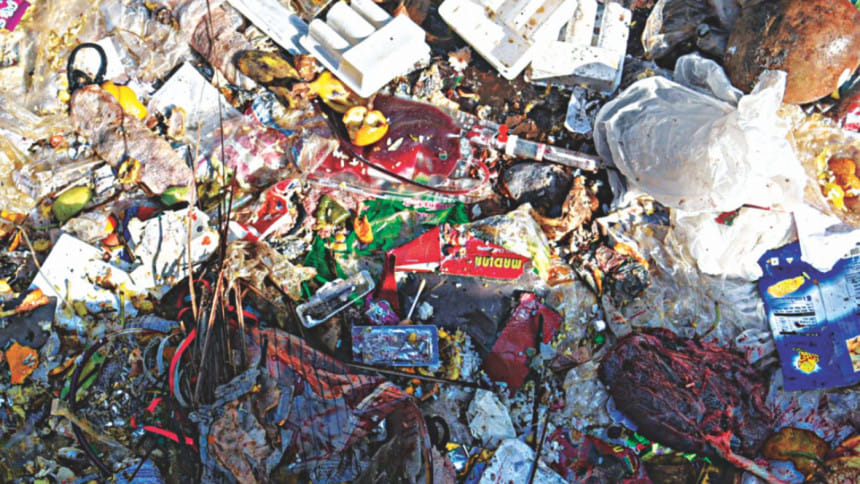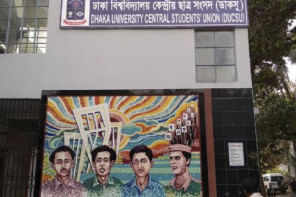Hazardous waste heaped in open bins

Hospitals and diagnostic centres in Chittagong are disposing medical waste in open bins, posing serious health hazards.
A total of 87 hospitals and 180 diagnostic centres are operating in Chittagong while only one private organisation, Chattagram Seba Sangstha, is working to dispose the medical waste, according to health department officials.
Jamir Uddin, the chief executive of the organisation, said only 130 hospitals and diagnostic centres out of over 250 in operation have signed agreements with them to responsibly dispose medical waste.
“We have the capacity to serve all the hospitals and diagnostic centres here but many are yet to sign up.”
Established in 2012, Chattagram Seba Sangstha collects medical waste in covered vans and takes it to a city corporation assigned area to burn in incinerators.
According to experts, medical waste must be disposed off such that it is not exposed. When medical waste comes in contact with air, water or earth, it has the potency of spreading germs and infectious matter, they added.
During a recent visit to several hospitals in Chittagong, The Daily Star found medical waste, including saline sets, syringes, blood transfusion sets, and surgical remains, all dumped in open dustbins.
Outside Jemison Red Crescent Maternity at Anderkilla, stray dogs and crows were seen scavenging for food from the piles of blood bags, syringes and cotton swabs, helping to spread the stench and germs.
Jagadis Dutta, a shopkeeper in the area, said he sees boys from neighbouring slums collect the saline sets and syringes from the dustbins with bare hands and no masks. “The rag-pickers sell the reusable items to scrap dealers, which are later sold without sterilisation.”
Admitting to being aware of infectious waste being disposed out in the open, Dr Sheikh Shafiul Azam, president of Chittagong District Unit Red Crescent Society, said, “We are in talks with a private organisation to install separate bins to differentiate and dump medical waste. The deal will be signed soon.”
Blood, body fluids and body secretions which are constituents of bio-medical waste harbour most of the viruses, bacteria and parasites that cause infection. Pneumonia, diarrhoea, tetanus, hepatitis B and C and even HIV/AIDS are common diseases spread due to improper waste management.
The bins look the same near Chittagong Medical College Hospital (CMCH), even though the government hospital has inked a deal with Chattagram Seba Sangstha.
The 1313-bed hospital that accommodates over 2,500 patients a day generates seven and a half tonnes of waste a day, including general waste.
The hospital is equipped with three clearly marked, covered bins across the building -- red for sharp objects, yellow for infectious but non-sharp objects and black bins for general waste.
CMCH Director Brig Gen Jalal Uddin said hospital staff is regularly instructed to use the bins appropriately.
“However, it can be seen that they falter. Patient attendees are often uneducated and use all the bins for general waste.”
The hospital pays Chattagram Seba Sangstha Tk 80,000 a month to dispose the waste in an environmentally-responsible way, said officials.
Chattagram Seba Sangstha collects the medical waste from the assigned bins at all their partner hospitals once a day, responded the CEO.
CMCH is a busy hospital and their bins end up overflowing, said Jamir. “The bins need to be cleared twice or thrice, but in that case, we need to be paid more.”
Chittagong General Hospital has no separate arrangement in place for medical waste disposal.
Dr Asim Kumar Nath, its superintendent, said the hospital had installed an incinerator in 2010 to destroy infectious waste, but it went out of order the very day it was opened.
“Ever since, no one paid attention to the matter and medical and general waste are discarded together.”
“I wrote to the health ministry three months back to address the issue. We are still awaiting a reply.”
Azadur Rahman, director of Department of Environment in Chittagong, said most hospitals and diagnostic centres in the district are running without taking a clearance from them.
Around 100 hospitals and diagnostic centres have applied and gotten the clearance, he added.
“We sent notices to them, hoping to bring them under the same process.”
It is not possible for one private entity to cover all the hospitals in Chittagong; more organisations should come up in this regard, added Rahman.

 For all latest news, follow The Daily Star's Google News channel.
For all latest news, follow The Daily Star's Google News channel. 



Comments